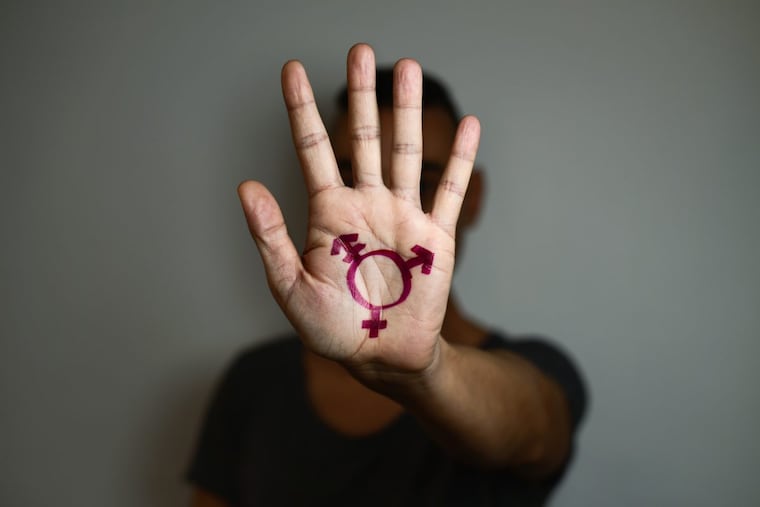Transgender kids vulnerable to bullying, long-term depression, large studies find
New research shows transgender and gender non-confirming youngsters are at far greater risk for depression, attention deficit disorder, suicidal thoughts, and other mental and emotional problems than their cisgender peers.

New research shows that transgender and gender nonconforming youngsters are at far greater risk for depression, attention deficit disorder, suicidal thoughts, and other mental and emotional problems than their peers.
Moreover, sexual minority youth — including those who identify as gay, lesbian or bisexual or are still questioning their identity — reported higher rates of cyberbullying and dissatisfaction with family relationships than heterosexual adolescents, resulting in higher levels of depression that persisted into early adulthood.
These youths were also more likely to have unmet medical needs, in part because they fear that health-care providers would disclose their sexuality or gender identity to their parents, researchers said.
Both studies were published online Monday in the May edition of the journal Pediatrics. Unlike much of the previous research on LGBTQ youth, these studies involved many subjects and large volumes of data.
In one of the studies, conducted by the researchers at the health management company Kaiser Permanente based on medical records, more than 1,300 transgender and gender nonconforming youngsters were found to have at least triple the rate of mental-health conditions of their cisgender peers (those whose gender aligns with their sex assigned at birth).
"Among these young people, the prevalent diagnoses were attention deficit disorders in children 3 to 9 years of age, and depressive disorders in adolescents 10 to 17 years of age," said Tracy A. Becerra-Culqui, the study's lead author.
At least 15 percent of trans children had attention deficit disorder, a rate three to seven times higher than cisgender youngsters.
Among teens, depression was reported in 49 percent of transfeminine youth (those assigned male at birth who identify as feminine) and 62 percent of transmasculine youth, four to seven times the rate of their cisgender peers.
Other emotional disorders also were far more prevalent among trans and gender nonconforming youths, including anxiety, eating disorders, and, especially troubling, suicidal thoughts.
Researchers said some of these conditions may be due in part to gender dysphoria, distress over feeling that one's identity doesn't match the assigned gender. The prevalence of emotional disorders, they added, may also reflect the stress from prejudice and discrimination many of these children experience.
The second study, which was conducted by the National Institutes of Health, involved nearly 2,400 sexual minority youths ages 17 to 21 and sought to identify factors contributing to higher rates of depression in this group. About 32 percent of the sexual minority youth reported being victims of cyberbullies and almost 40 percent said they had "low satisfaction" with family relationships – twice the rate of heterosexual teens.
The research also found that almost 30 percent of the sexual minority youth thought they did not have adequate medical care in the 12 months before the study.
Jeremy Luk, lead NIH study author, said the research shows that adolescence is an important time to help these youth address their depression.
"Without appropriate screening and intervention, these disparities may likely persist into young adulthood," said Luk.
Elaine Dutton, Trans Care Services Manager at Philadelphia's Mazzoni Center, said the findings are consistent with the experiences of youths at the center's Pediatric & Adolescent Comprehensive Transgender Services program.
"Many of the youth in our PACTS program report having experienced bullying in school, lack of acceptance and understanding from family members, and high rates of depression and anxiety," Dutton said.
In May, the PACTS team will launch two new support groups for children ages 5 to 17 who are nonbinary, not identifying as either male or female. Dutton said the initiative, similar to support groups available to trans youth, came about after hearing from nonbinary kids as young as 7 who said they wanted a group of their own.
"Nonbinary youth often report feeling incredibly isolated, which can lead to symptoms of depression, and anxiety in social situations," Dutton said. "Creating a space for nonbinary youth to connect with one another will help to alleviate that isolation, and ideally minimize symptoms of depression and anxiety if they are present."
Two new national studies released Monday show the high risks of LGBTQ children and teens for depression, thoughts of suicide, and other mental-health problems, compared with their cisgender peers. One of the studies says nearly a third of these kids are cyberbullied and many have unmet medical needs. The reason for the latter is they're afraid their doctors will tell their parents they're gay. On a more positive note, Philadelphia's Mazzoni Center is announcing it is starting a new support group project for non-binary kids ranging from teenage to as young as 5.